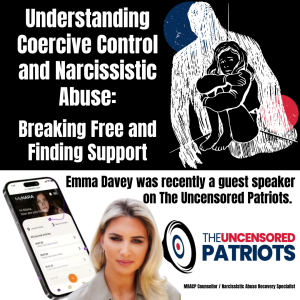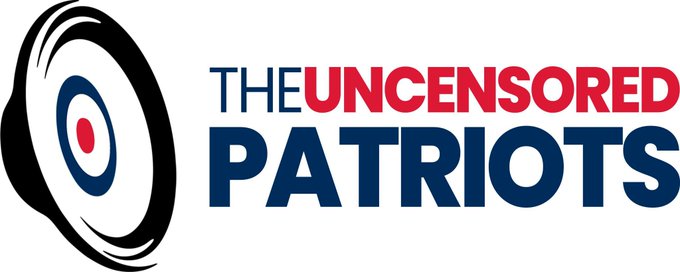
Coercive control and narcissistic abuse are terms that describe insidious forms of emotional and psychological manipulation that can leave victims feeling trapped, isolated, and powerless. These forms of abuse often go unnoticed by outsiders, making it critical to raise awareness and provide resources for those affected. This post explores what coercive control and narcissistic abuse entail, their impact, and how victims in the UK can access help, including innovative tools like the MyNARA app developed by Emma Davey.
Emma Davey was recently a guest speaker on The Uncensored Patriots. See below to listen to the space. It was fantastic of Emma to share her time and expertise and she answered several questions, put to her from listeners.
Coercive control is a pattern of behaviour used to dominate and manipulate another person, stripping away their autonomy and self-worth. Unlike physical abuse, coercive control often relies on non-physical tactics such as intimidation, gaslighting, isolation, and financial control. It’s about power—keeping the victim under the abuser’s thumb through fear and dependency.
Examples include:
In the UK, coercive control is a criminal offense under the Domestic Abuse Act 2021, recognising its devastating impact. Victims may not realise they’re being controlled until the pattern becomes overwhelming, which is why education and support are vital. Unlike physical abuse, coercive control often leaves no visible scars, but its effects—such as anxiety, depression, and loss of identity—are profound. It’s about power, creating an environment where the victim feels they have no choice but to obey.
Narcissistic abuse stems from individuals with narcissistic traits or Narcissistic Personality Disorder (NPD). These abusers manipulate through tactics like love-bombing (overwhelming affection to hook the victim), devaluation (criticism and belittling), and discarding (abandoning the victim once their “use” is over). Gaslighting—making the victim doubt their reality—is a hallmark, leaving them questioning their sanity.
Everyone argues from time to time. However, if there is a consistent pattern of behaviour from your partner that intimidates, upsets, hurt, harms, demeans or prevents you from making your own decisions, your partner may be using coercively controlling behaviour. If you answer ‘yes’ you may be being abused. Find the DASH Risk Checklist questions here:
Emma Davey, a UK-based trauma-informed counsellor and survivor, describes narcissistic abuse as “deadly” because it can push victims to emotional or physical breaking points. Her work highlights the importance of recognising these patterns early. https://mynara.app
The effects of coercive control and narcissistic abuse are profound and can have devastating psychological and emotional effects. Victims often experience:
The trauma bond—a chemical dependency similar to addiction—makes leaving particularly challenging. Victims may return to abusers multiple times, believing they can “fix” the relationship.
Emma Davey emphasises that recovery is possible but challenging, as victims may develop trauma bonds—addictions to the abuser akin to substance dependency. Breaking free requires support, validation, and practical tools.
Emma Davey, a qualified integrative counsellor, created the MyNARA app (My Narcissistic Abuse Recovery App) to empower victims of narcissistic abuse and coercive control. Emma Davey, a UK-based trauma-informed counsellor, knows these struggles first-hand. After enduring six years of coercive control and narcissistic abuse from her ex-partner, who was convicted in 2022, she transformed her pain into purpose. Fleeing to Australia, she qualified as a counsellor and founded MyTraumaTherapy, later creating MyNARA (My Narcissistic Abuse Recovery App) to help others. Launched in October 2023, MyNARA is a discreet tool designed to help survivors document abuse and access recovery resources safely.
Key features include:

Davey’s app addresses a critical gap: gathering evidence for prosecution, which she struggled with when her abuser destroyed her phones and hacked her devices. MyNARA empowers victims to document abuse safely and access support 24/7, especially when specialist counsellors are scarce or costly. Available on app stores or at www.mynara.app, it’s a vital resource for those seeking safety and justice.
Leaving an abusive situation is daunting, but small steps can lead to freedom:
Coercive control and narcissistic abuse thrive in silence, but awareness and support can break their hold. Emma Davey’s MyNARA app is a testament to the power of resilience, offering practical tools to escape and heal. In the UK, victims have access to helplines, legal protections, and innovative solutions to reclaim their lives. If you or someone you know is struggling, don’t wait—reach out to a helpline, download MyNARA, or contact a counsellor. You are not alone, and freedom is possible.
Breaking free from coercive control or narcissistic abuse requires courage and resources. Here are key support options in the UK:
If you’re in immediate danger, call 999. For non-emergencies, report coercive control to the police, as it’s a crime carrying up to seven years’ imprisonment.

Read more articles here: https://tupatriots.org/news-articles
© The Uncensored Patriots - 2025. All rights reserved. Web design and maintenance by Consiliuma. Articles by TUP Community Members.